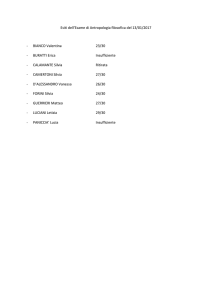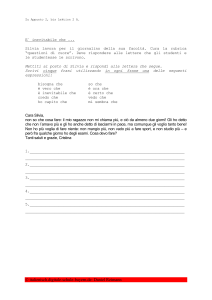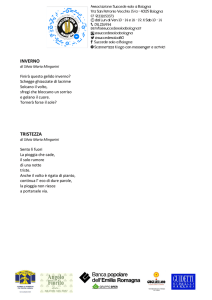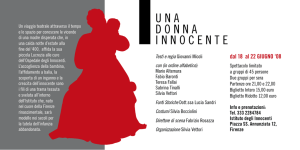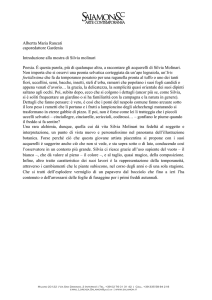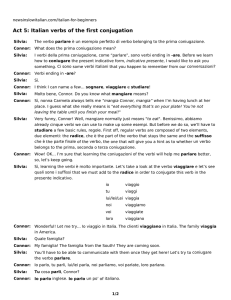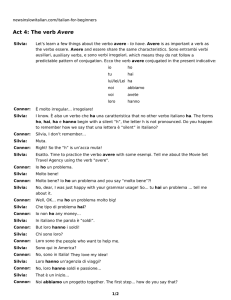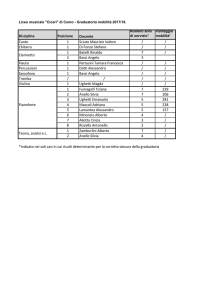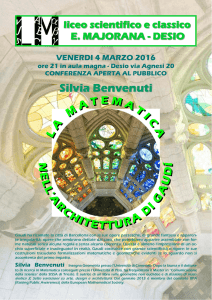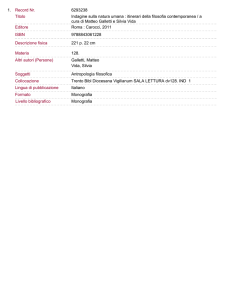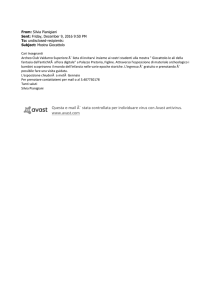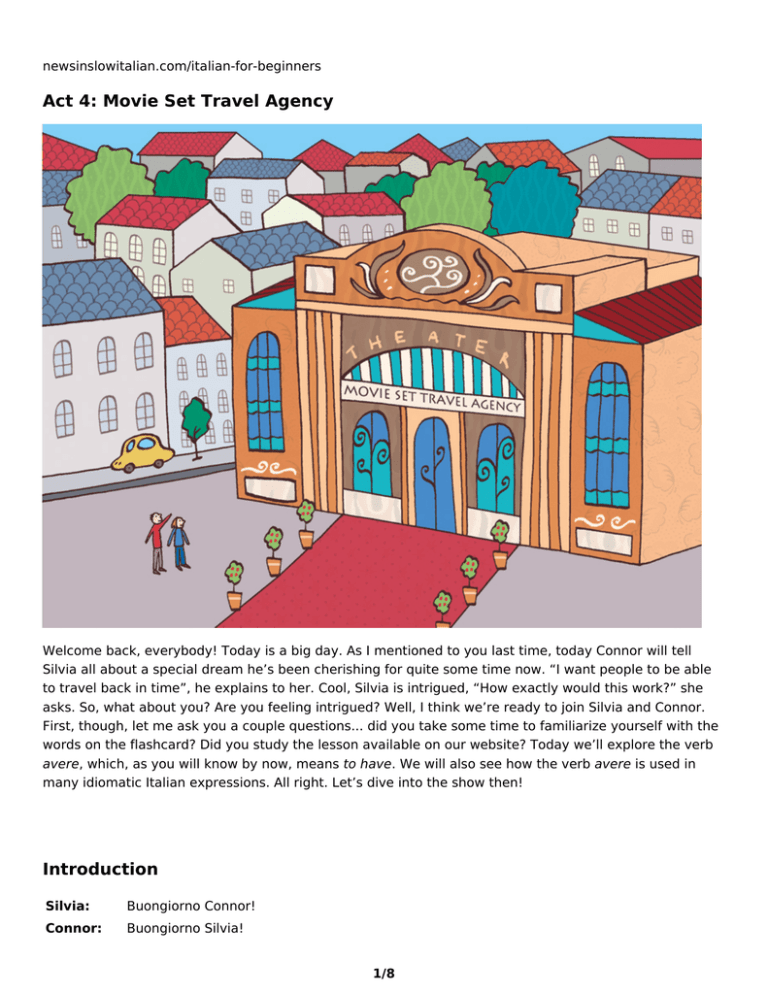
newsinslowitalian.com/italian-for-beginners
Act 4: Movie Set Travel Agency
Welcome back, everybody! Today is a big day. As I mentioned to you last time, today Connor will tell
Silvia all about a special dream he’s been cherishing for quite some time now. “I want people to be able
to travel back in time”, he explains to her. Cool, Silvia is intrigued, “How exactly would this work?” she
asks. So, what about you? Are you feeling intrigued? Well, I think we’re ready to join Silvia and Connor.
First, though, let me ask you a couple questions... did you take some time to familiarize yourself with the
words on the flashcard? Did you study the lesson available on our website? Today we’ll explore the verb
avere, which, as you will know by now, means to have. We will also see how the verb avere is used in
many idiomatic Italian expressions. All right. Let’s dive into the show then!
Introduction
Silvia:
Buongiorno Connor!
Connor:
Buongiorno Silvia!
1/8
Silvia:
You are dressed formal, oggi.
Connor:
Sí. Ci sono some good news, Silvia!
Silvia:
News? Novità?
Connor:
I’m going to meet with some people who might be interested in my project...
Silvia:
May I ask you what your progetto is about?
Connor:
I haven’t told you. Well... My progetto... È una cosa about Italia...
Silvia:
Sono curiosa! Go ahead and tell me more!
Connor:
I’m not sure I can say all of that in Italiano yet.
Silvia:
You know that you can switch back to English when you are running out of words in
Italian.... and then go back to Italian quickly.
Connor:
Let me try then... C’è un sogno. C’è Italia in this dream of mine. I want to open a travel
agency! Here we go, I said it!
Silvia:
Dove?
Connor:
Here, in America!
Silvia:
Will your agenzia di viaggi help people go to Italia?
Connor:
Sì! But è un’agenzia… unique…
Silvia:
Allora è un’agenzia speciale!
Connor:
Sì! Here is my idea... I want people to be able to travel back in time!
Silvia:
…It sounds like a lot of fun! And how exactly would this work?
Connor:
You already know that I am in love with Fellini, Mastroianni, Sofia Loren, e i film anni
Cinquanta e anni Sessanta!
Silvia:
Sì, certo.
Connor:
So, every trip will be a recreation of un film!
Silvia:
Your clienti will choose un film italiano e...
Connor:
…È molto romantico! Molto bello! May I give you un esempio?
Silvia:
Sì, certo.
Connor:
OK... Just picture the scene of the Fontana di Trevi from La Dolce Vita. Due clienti from
America, just married, they want to be Marcello e Sylvia e dance at midnight in the Fontana
di Trevi! My agency will arrange that for them!
Silvia:
Movie Set Travel Agency?
Connor:
Sì! Esatto! Maybe that could be the name...
Silvia:
Is this why you want to imparare l’italiano?
Connor:
Sì... ci sono molte ideas in my head. Ci sono many movie scenes that I want to recreate!
Silvia:
Ma you know that c’è un problema?
Connor:
What problema?
Silvia:
Italy is not like that anymore...
Connor:
Ma la Fontana di Trevi c’è?
Silvia:
Certo, c’è! Still there...
2/8
Connor:
So, non ci sono problemi, Silvia.
Silvia:
Well, I don’t want to disappoint you, ma I see more than un problema. Ma c’è una cosa I
can help you with.
Connor:
Tell me about it!
Silvia:
I can help you explore hidden places, places off the beaten track... dove c’è still the Italia
that you dream about, or at least something resembling your idee romantiche...
Connor:
Come tu... how do you say to dream?
Silvia:
Sognare.
Connor:
Silvia, io non sono un americano who wants to visit Italy in a week and then go home! I
want to breathe and fully appreciate the local culture!
Silvia:
Tu sei un poeta, caro Connor!
Connor:
Grazie, Silvia... wish me luck! Fortuna!
Silvia:
In bocca al lupo, Connor!
Connor:
What?
Silvia:
It means “in the mouth of the wolf”!
Connor:
Why would I want to go there?
Silvia:
Well... Let’s start our lezione di grammatica and then we’ll go over the wolf’s mouth in our
expression section, OK?
Grammar 1: The verb Avere
Silvia:
Let's learn a few things about the verbo avere - to have. Avere is as important a verb as
the verbo essere. Avere and essere share the same characteristics. Sono entrambi verbi
ausiliari, auxiliary verbs, e sono verbi irregolari, which means they do not follow a
predictable pattern of conjugation. Ecco the verb avere conjugated in the present indicative:
io
ho
tu
hai
lui/lei/Lei ha
noi
abbiamo
voi
avete
loro
hanno
Connor:
È molto irregular... irregolare!
Silvia:
I know. È also un verbo che ha una caratteristica that no other verbo italiano ha. The forms
ho, hai, ha e hanno begin with a silent “h”, the letter h is not pronounced. Do you happen
to remember how we say that una lettera è “silent” in Italiano?
Connor:
Silvia, I don’t remember...
Silvia:
Muta.
Connor:
Right! So the “h” is un’acca muta!
Silvia:
Esatto. Time to practice the verbo avere with some esempi. Tell me about the Movie Set
Travel Agency using the verb "avere".
3/8
Connor:
Io ho un problema.
Silvia:
Molto bene!
Connor:
Molto bene? Io ho un problema and you say “molto bene”?!
Silvia:
No, dear, I was just happy with your grammar usage! So… tu hai un problema … tell me
about it.
Connor:
Well, OK… ma ho un problema molto big!
Silvia:
Che tipo di problema hai?
Connor:
Io non ho any money…
Silvia:
In italiano the parola è “soldi”.
Connor:
But loro hanno i soldi!
Silvia:
Chi sono loro?
Connor:
Loro sono the people who want to help me.
Silvia:
Sono qui in America?
Connor:
No, sono in Italia! They love my idea!
Silvia:
Loro hanno un’agenzia di viaggi?
Connor:
No, loro hanno soldi e passione...
Silvia:
That è un inizio...
Connor:
Noi abbiamo un progetto together. The first step... how do you say that?
Silvia:
First step? Primo passo.
Connor:
The primo passo è avere un place for the agenzia di viaggi.
Silvia:
I see... Have you already seen this place?
Connor:
I'm checking it out today!
Silvia:
So, is this why you are wearing a suit oggi?
Connor:
Sì! Ho un... app... I had learned that parola the other day by myself but I can’t say it now...
Silvia:
Appuntamento?
Connor:
Sì, io ho un appuntamento with Mr. Mark. Lui ha un movie theater, piccolo, a bit oldfashioned. Un real movie theater! He needs to sell it and... I would like to buy it!
Silvia:
This is exciting! Avete un appuntamento after our lezione?
Connor:
Sì! The first appuntamento!
Silvia:
Hai paura that something may go wrong?
Connor:
What does that mean?
Silvia:
Avere paura means “to be afraid”.
Connor:
Io ho molta paura.
Silvia:
Why? Is that because è il primo appuntamento?
Connor:
Sì, but also because my idea è very speciale...
Silvia:
Abbiamo the same parola in italiano, idea. It's spelled the same way as in Italian, only the
pronunciation è diversa.
4/8
Connor:
Ho paura my idea speciale may not be understood… you don’t come across a Movie Set
Travel Agency every day, you know it might seem a little too strange, io non ho paura di
Mark, though. Lui è molto gentile.
Silvia:
Secondo passo avanti! Let’s recap now!
Connor:
Io ho un’idea speciale. Mark ha un movie theater. Noi abbiamo un primo appuntamento
oggi. Loro hanno soldi. Io ho paura.
Silvia:
This is absolutely perfect! You have learned how to use the verbo avere very well. We will
see a few expressions that feature the verbo avere in the seconda parte of our lezione di
grammatica!
Grammar 2: Idiomatic expressions with Avere
Silvia:
Now that we know what the present tense of the verbo avere looks like, we can use it to
form some idiomatic expressions. This can be a little tricky for an English speaker. In fact,
while in English expressions are generally formed with the verb “to be” followed by an
adjective, in Italian we use avere followed by a noun. To describe our feelings, for example,
we use the verbo avere. We have already mentioned avere paura.
Connor:
Right. Connor ha paura about the primo appuntamento. Io ho paura.
Silvia:
Esatto. Un’altra espressione è avere bisogno di, which means “to need”.
Connor:
So, we need money would be... abbiamo bisogno di soldi?
Silvia:
Sì, avete bisogno di un cinema e avete bisogno di soldi to buy it.
Connor:
Mr. Mark ha bisogno di sell the cinema.
Silvia:
Looks like he does! Un’altra espressione è avere voglia di which means “to feel like” or
“to want”. Hai voglia di... che cosa, Connor?
Connor:
Ho voglia di open my agenzia di viaggi very soon! Ho voglia di avere molti clienti!
Silvia:
You will, sono sicura.
Connor:
Grazie, Silvia. I think that people hanno bisogno di essere felici e io ho voglia di make
them felici! Am I right?
Silvia:
Perfetto, Connor! Actually, you can use an expression to say “to be right”! Italians say
avere ragione.
Connor:
Io ho ragione?
Silvia:
Tu hai ragione!
Connor:
I am learning a lot of things oggi! Ho voglia di learn more!
Silvia:
Certo! To ask “how old are you” we say something whose literal translation would sound like
“how many years do you have?” Funny, ho ragione?
Connor:
Sì, molto funny! Let me try to translate that... So, how è quanti... years è anni... to have è
avere...
Silvia:
I am impressed! So, if I ask you: quanti anni hai? How would you answer?
Connor:
Io ho 28 anni.
Silvia:
Bravo! Your turn.
Connor:
Quanti anni ha your dog?
5/8
Silvia:
Ha 5 anni. Quanti anni ha the cinema?
Connor:
Ha 83 anni, Silvia! Like nonno Giovanni! È un sign!
Silvia:
Hai ragione, è un segno of fate! But tu hai pazienza? Can you wait?
Connor:
What is avere pazienza?
Silvia:
To be patient...
Connor:
Ah! Non ho pazienza, but... ho bisogno di avere pazienza, molta pazienza.
Silvia:
Patience is a virtue, as we say in italiano, la pazienza è una virtù!
Connor:
Ci sono momenti that io non ho any pazienza!
Silvia:
Quali sono?
Connor:
Sono due, when I feel sleepy and when I am hungry!
Silvia:
Quando hai sonno e quando hai fame. That’s understandable, io sono come te.
Connor:
Tu hai fame, now?
Silvia:
No, non ho fame but ho voglia di cioccolato!
Connor:
Noi non abbiamo fame, but abbiamo bisogno di un caffè!
Silvia:
Why?
Connor:
Because abbiamo sonno! And I cannot go to my appointment being sleepy, ho ragione?
Silvia:
You are wrong, tu hai torto.
Connor:
I am wrong? Ho torto?
Silvia:
I am kidding!
In bocca al lupo! / Crepi il lupo!
Silvia:
Connor, before we get to our nuova espressione idiomatica, let’s go over the espressioni
that you already know.
Connor:
C’è Mamma mia, for example. And then ci sono the espressioni which use numeri!
Silvia:
Could you pick a couple of them and put them into context?
Connor:
I am going to fare quattro chiacchiere with Mr. Mark about his cinema, but ho paura.
Silvia:
That’s more than great, Connor! This is absolutely excellent! So, as you can imagine, in
italiano abbiamo una miriade of this funny piccole espressioni. Oggi we’ll get to know the
expression “in bocca al lupo”, which is how we wish someone buona fortuna in italiano.
Connor:
In bocca al lupo. What does that mean exactly?
Silvia:
In the mouth of the wolf!
Connor:
What?
Silvia:
Mouth means bocca and wolf means lupo.
Connor:
You’re scaring me now... essere in the bocca of the lupo, I mean, you need molta buona
fortuna, ho ragione?
Silvia:
Sì, hai ragione, c’è bisogno di fortuna! Would you like me to tell you the whole story?
Connor:
È una cosa scary again?
6/8
Silvia:
Well... I’ll let you be the judge of that! We say “crepi il lupo”! A literal translation for that
would be “may the wolf die”… although its English equivalent would be “knock on wood”.
Connor:
Voi avete una rough way to say knock on wood, Silvia!
Silvia:
Well, if somebody says to you “in bocca al lupo” you are not supposed to answer grazie.
If you do, people will look at you in a very strange way, they will be puzzled...
Connor:
You can’t be serious!
Silvia:
Davvero, caro Connor. Concepts such as fortuna e sfortuna sono molto importanti
in a country filled with little superstitious rituals, such as Italy!
Connor:
Good to know, Silvia. I’ll be careful not to make mistakes once I get there!
Silvia:
Let’s practice a little. In bocca al lupo for your appuntamento!
Connor:
Crepi il lupo, Silvia!
Silvia:
That was easy, wasn’t it?
Connor:
Sì, but ho paura I won’t be persuasive enough.
Silvia:
You mean, during the appuntamento?
Connor:
Sì! My sogno è tanto grande... if I get distracted dreaming about it, the wolf, the lupo will
eat me! Just playing with parole... but, well... who knows...
Silvia:
And the lupo would be Mr. Mark, I’m guessing. Lui ha bisogno di sell the cinema... Sono
sicura that he doesn’t want to fall in the bocca of the lupo either. And to him, tu sei the
lupo!
Connor:
Io sono un lamb, Silvia! Ho una domanda. When would it be an appropriate time to say
buona fortuna when you want to wish good luck to someone?
Silvia:
If you care about this person… NEVER!
Connor:
C’mon, Silvia!
Silvia:
It is considered impolite (and quite uncool) to wish someone good luck by saying buona
fortuna. The socially acceptable way to wish buona fortuna è in bocca al lupo, which is the
equivalent of the espressione inglese “break a leg”.
Connor:
OK, got it.
Silvia:
Bravo. Hai fretta, are you in a rush to go to the appuntamento?
Connor:
Sì, Silvia, un po’.
Silvia:
Non avere paura, OK?
Connor:
Hai ragione, Silvia! This will be my new mantra. Non ho paura!
Silvia:
In bocca al lupo, Connor! Alla prossima!
Connor:
Crepi il lupo, Silvia! Ciao!
Until next time
Wow! Did you guys see this coming? Connor wants to open a travel agency! Not just any travel agency,
mind you! He’s developing a whole new concept. His agency will be inspired by glamorous black-andwhite Italian movies. Yes, those old movies from the fifties and sixties we all love. So, basically, each trip
will somehow recreate the atmosphere of a famous movie scene. Connor, of course, is not wasting any
time and has already set his eyes on a building that would be just perfect for accommodating his offices.
I guess we’ll hear more about that next time. In the meantime, keep learning your verbs and new
expressions and use them as often as you can.
7/8
A presto!
8/8

